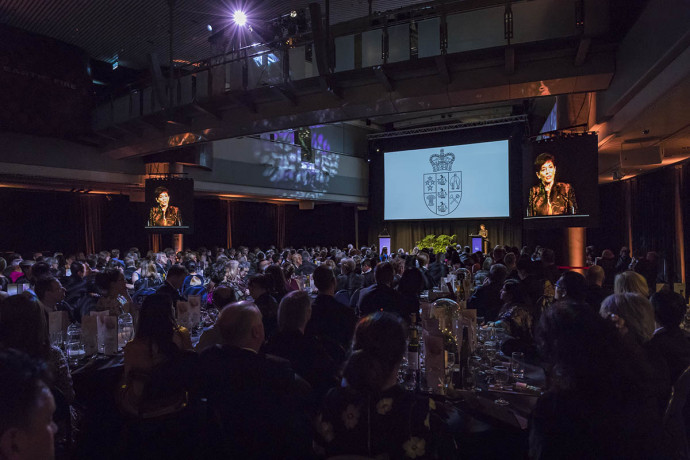Video: Our Patron's address at 2018 Research Honours Aotearoa

Our Patron, the Rt Honourable Dame Patsy Reddy, Governor-General of New Zealand, gave a stirring speech at this year's Research Honours Aotearoa.
Rau rangatira mā, e kui mā, e koro mā, e huihui nei,
tēnei aku mihi māhana ki a koutou.
Kia ora tātou katoa.
It’s a privilege to be here to honour the eminent scholars and scientists whose work expands our knowledge and understanding of our culture, history, and physical world.
At this point in the 21st century, it’s no exaggeration to say that the stakes are very high, and much rides on the success of your work.
Bertrand Russell summed it up like this:
‘Broadly speaking, we are in the middle of a race between human skill as a means – and human folly as an end’.
There can be few times in our history when we’ve been so indebted to the skill of our researchers and scientists – in both identifying our follies – and in providing us options for the way forward.
As always, the goal is to promote wider understanding of that work, so more New Zealanders understand our past as well as our present-day challenges – and appreciate and value your contributions to the solutions.
If we consider one of the most pressing issues – climate change – it’s clear that apathy, despair, denial and wilful ignorance are not going to deliver positive outcomes.
We need broad understanding and consensus about what sustainability looks like – and how we can live without causing further harm to the natural world – as well as how to mitigate the harm we’ve already inflicted on it.
That’s where the mission of the Royal Society Te Apārangi becomes so valuable, particularly the various ways that you seek to inform and influence the public, the private sector, and our decision-makers.
If key influencers can be persuaded, so too can our communities.
If our citizens understand the implications of research findings, and what they can do on a personal and local level, they are empowered to make a positive difference.
I have just finished hosting 14 investiture ceremonies in Wellington, Auckland and Christchurch. It was encouraging to note how often I presented insignias to people honouring their work and dedication to such things as re-forestation, water quality, protection of our native flora and fauna, and social or cultural programmes to improve the quality of life for their local communities. It’s a strong illustration of how our society values what is important to us.
As I visit different parts of the country I am also impressed to see in operation many projects where individuals, local authorities, iwi, historians and scientists are working together to restore the environment and improve the future prospects for their communities.
Everyone can and should contribute to addressing these challenges, and there is much to be gained from bringing diverse perspectives to the table.
The Royal Society Te Apārangi’s climate-change roadshow, facilitating conversations in art galleries between art and science, is a perfect example of disciplines talking to each other, of STEM becoming STEAM.
And I am delighted to see a commitment to further acknowledge Mātauranga Māori in the three new awards being presented this evening. It is welcome recognition of the importance of the leadership your society can bring to the need for diversity, so that we learn from many perspectives and people, to reduce the risks of repeating the mistakes that were made in the past.
Last month, Professor Gerrard kindly agreed to speak at a dinner I hosted to mark the 125th anniversary of women’s suffrage.
She spoke about how, as a young woman scientist in a male dominated profession, she had been mentored and assisted by male colleagues during her career, but she noted that even now, in our supposedly egalitarian and inclusive society, roadblocks still exist for women in science.
Her comments mirrored my own experience in the legal profession and in governance roles during my career.
Fortunately, there is now clear evidence that having more women on selection boards and decision-making bodies results in greater gender equity, as well as better results for the organisations concerned.
I have no doubt that Professor Gerrard, in her role as Government Science Adviser, will use her considerable powers of persuasion to whittle away some of the barriers women face in terms of recruitment, training, and promotion.
And I wish her every success with those goals.
To conclude, on behalf of all New Zealanders, I thank our science and humanities researchers for the work you do, for debunking myths, for challenging lazy assumptions, for helping us understand how and why we have arrived at our present state of affairs – and helping our decision-makers consider what the wisest options might be for the future.
I trust that with your help, and with greater awareness and commitment from our citizens, intellectual skill will indeed win the race and triumph over our regrettable follies.
In that spirit, I am very pleased now to present the Royal Society Te Apārangi’s top honours.
Dame Patsy then presented the Te Puāwaitanga Award to Linda Tuhiwai Smith and the Rutherford Medal to Rod Downey.
